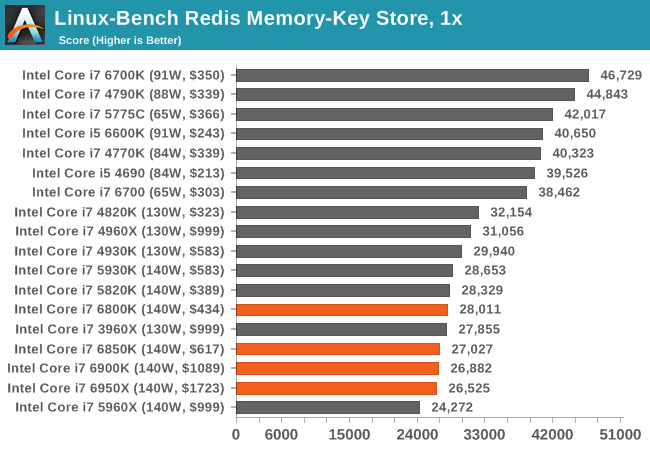The Intel Broadwell-E Review: Core i7-6950X, i7-6900K, i7-6850K and i7-6800K Tested
by Ian Cutress on May 31, 2016 2:01 AM EST- Posted in
- CPUs
- Intel
- Enterprise
- Prosumer
- X99
- 14nm
- Broadwell-E
- HEDT
Linux Performance
Built around several freely available benchmarks for Linux, Linux-Bench is a project spearheaded by Patrick at ServeTheHome to streamline about a dozen of these tests in a single neat package run via a set of three commands using an Ubuntu 11.04 LiveCD. These tests include fluid dynamics used by NASA, ray-tracing, OpenSSL, molecular modeling, and a scalable data structure server for web deployments. We run Linux-Bench and have chosen to report a select few of the tests that rely on CPU and DRAM speed.
C-Ray: link
C-Ray is a simple ray-tracing program that focuses almost exclusively on processor performance rather than DRAM access. The test in Linux-Bench renders a heavy complex scene offering a large scalable scenario.

NAMD, Scalable Molecular Dynamics: link
Developed by the Theoretical and Computational Biophysics Group at the University of Illinois at Urbana-Champaign, NAMD is a set of parallel molecular dynamics codes for extreme parallelization up to and beyond 200,000 cores. The reference paper detailing NAMD has over 4000 citations, and our testing runs a small simulation where the calculation steps per unit time is the output vector.

Redis: link
Many of the online applications rely on key-value caches and data structure servers to operate. Redis is an open-source, scalable web technology with a strong developer base, but also relies heavily on memory bandwidth as well as CPU performance.
[words]












205 Comments
View All Comments
michael2k - Tuesday, May 31, 2016 - link
Zen doesn't exist, yet, so cannot compete at all.When Zen does exist, however, AMD would literally win a Darwin Award if they offer more than a 10% discount for parts that perform similarly.
In other words, if Zen is capable of powering a 10 core part that offers 90% of the 6950X performance, expect it to cost $1,550. If it offers 110% of the performance, expect it to cost $1,725.
Spunjji - Wednesday, June 1, 2016 - link
There's a small fault in your logic, which is that if they priced it like Intel are here they would sell as few of them as Intel clearly expect to, and thus struggle to make the market share gains that they badly need.I'd expect a competitive product to cost something more like $1000 (at which price they would still be making PHENOMENAL margins) and force a price-drop from Intel. They're not going to give anything away for free, but they absolutely stand to benefit from being less obscenely liberal with their margins than Intel.
This is assuming they execute on time and as promised, which is, well, not very AMD of late.
cswor - Wednesday, June 8, 2016 - link
I agree. In their underdog position, they need to undercut and can still probably make a nice profit on a chip priced to sell larger volumes, assuming it performs and they can manufacture it.Azix - Tuesday, May 31, 2016 - link
AMD might not have the luxury of not going for the jugular. If the yields aren't great maybe their prices will be that high. They won't gain market share/mind share with high prices though.just4U - Tuesday, May 31, 2016 - link
They won't be that high. AMD has only been able to price their higher end consumer processor at intel pricing "once" (to my knowledge) and it didn't stay there long.nandnandnand - Tuesday, May 31, 2016 - link
How do we know that Zen is that close to Broadwell in IPC (and Skylake, since there is very little difference)? I'd love for it to be true, but AMD's Zen 8 cores need to solidly beat Intel's quad cores and do almost as well in single threaded performance.retrospooty - Tuesday, May 31, 2016 - link
" Zen is supposed to be really, really close to Broadwell in IPC"- What has AMD done in the past decade that makes you believe that? I will believe it when its released and retail units (not engineering samples) are independently tested. Until then I don't believe anything AMD says.
Drumsticks - Tuesday, May 31, 2016 - link
I'm not about to sing the praises of AMD completely yet, but I think there's reason to believe they're more focused than they've been in the last ten years. On top of that, Jim Keller was good way back when, he's proved he still has great ideas now with Apple, so there's hope that Zen could really impress. They still have to execute (something we know isn't a given for AMD) but we'll know all in a few months time.If the rumors were true about Vega in October (I doubt they are), they could have a pretty nice high publicity 1-2 punch. It's unlikely Vega will show up then, but I'd be pretty happy if it did.
retrospooty - Tuesday, May 31, 2016 - link
I hear you, and I have heard that too... But all the same, AMD's PR is always far more active than their engineering teams leading up to launch. If it comes out and is as fast as they seems o think it will be and doesn't have any major heat or power issues (that cause the need to clock it lower than expected) it may be good... All the same, its best to wait until retail chips are released, prices set and units reviewed to decide.michael2k - Tuesday, May 31, 2016 - link
I am enthusiastic too, but if Zen really is that powerful I cannot imagine it selling at 30% of Intel prices. The more powerful the part, the higher the price will be, up to 90% of Intel's prices for similar performance.